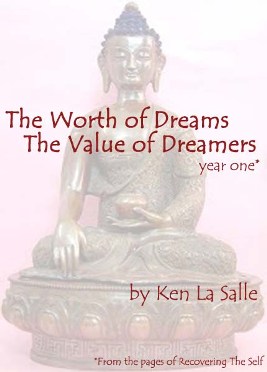Inspirational
And Still, There Is Water
by Ken La Salle
Welcome back to my continuing series of Rules For Life.
This month, I would like to talk about something that was missing for much of my life. Like many people, I made it through many years without this missing piece. Like so many, I had no idea how important that missing piece was. The missing piece in question is, of course, optimism.
It’s hard to be optimistic. So much of life is constantly difficult and, for many, a positive outcome is just so much to wish for. And I was raised in a poor family, surrounded by other poor people, which certainly didn’t help much. People in lower economic brackets, and that’s most people, have a harder time seeing things really work out for them and so it’s hard for them to be optimistic.
I won’t kid you. It’s not easy to say, “I’m going to be optimistic,” and mean it and stick by it… especially when so much of life seems determined to butcher our expectations.
And still, what is the alternative? Pessimism, of course. Some may include Realism as an alternate choice, but when faced with the choice between believing things will work out (optimism) and believing they won’t (pessimism), realism simply doesn’t fit. Realism can change to either pessimism or optimism, depending on how you look at it.
Often, you’ll hear people refer to the choice between optimism and pessimism in the form of this question: “Is the glass half-full or half-empty?” You have a glass filled halfway with water. Is it half-full or half-empty? The problem with this question is that the glass is both. The glass in question is, at the same time, half-full and half-empty. So, to claim it is only one thing is wrong.
Optimism is easy with a full glass of water. It’s not too difficult with half a glass. But what about when your glass has only a few drops? What about when there is only some condensation on the glass? That’s when a true optimist will tell you, “And still, there is water.”
Why is this an important rule for life? Why should we choose to be optimistic?
Modern science has shown in study after study that optimism makes us healthier people. It reduces stress, regulates our emotions, boosts our immunity, strengthens our hearts – and on and on. Optimism is good for our bodies.
Not only that, optimism is also good for our spirit (if I may use that term in its most secular form). Optimism, like happiness, is a choice. Choosing optimism may seem foolish at times, and I happily acknowledge that it’s risky, but it is also a choice that makes life feel better.
We live in a world filled with tough decisions. Global warming, political corruption, war, crime, disease, families in crisis – these are problems not easily fixed. Some may seem impossible to fix. But how much faster can we fix them if we start from a position of pessimism rather than one of optimism? How much easier is it to achieve the seemingly impossible if we believe we can’t do it rather than believing we have a shot?
Try this exercise with me. How’s your day going to be? It’s going to be good, isn’t it? Heck, it may even be great! And those goals and dreams that you have are going to work out because you’re going to put the necessary work into it to make it happen. And you’re going to be loved because you are worthy of love. And things are going to work out just fine.
There. Did you feel that? Did you feel a little optimism come across the page? I hope you did and I hope that little feeling of optimism helped you see the benefits your own optimism can bring to your life.
After all, when faced with a choice between despair and empowerment, why choose despair? Why look at that glass and see only the part that is empty. Better to look and acknowledge, “Still, there is water.”
About the Author
Author and Playwright, Ken La Salle grew up in Santa Ana, California and has remained in the surrounding area his entire life. He was raised with strong, blue-collar roots, which have given him a progressive and environmentalist view. As a result, you’ll find many of his stories touching those areas both geographically and philosophically. His plays have been seen in theaters across the country and you can find a growing number of books available online. Find out more about Ken on his website at www.kenlasalle.com. Ken La Salle is represented by Loiacono Literary Agency, LLC.





